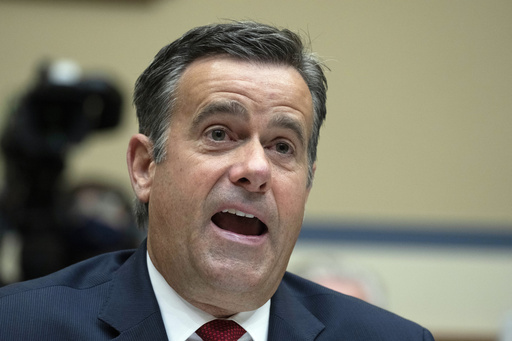
WASHINGTON — President-elect Donald Trump has declared his intention to appoint John Ratcliffe as the new director of the CIA in his upcoming administration. Below are five significant details regarding Ratcliffe, the Republican nominee poised to lead the nation’s principal intelligence agency:
**Second Role in the Trump Administration**
Ratcliffe’s previous experience includes serving as the director of national intelligence during the closing months of Trump’s first term, where he managed the U.S. intelligence community amid the challenges posed by the coronavirus pandemic. His role as DNI encompassed the crucial task of identifying and combating foreign interference in U.S. electoral politics. This background positions him as a more conventional choice for the CIA role compared to some rumored candidates favored by Trump’s supporters.
In his capacity as DNI, Ratcliffe participated in a notable evening news conference just weeks before the 2020 presidential election, during which he and other officials accused Iran of orchestrating a series of emails designed to intimidate American voters. While in this role, he also faced backlash for declassifying Russian intelligence that allegedly contained information about the Democratic Party during the 2016 elections, despite recognizing that the accuracy of the intelligence was uncertain. Many Democrats condemned this action as a politically motivated maneuver that compromised the integrity of intelligence gathering.
**A Strong Supporter in Congress**
Ratcliffe entered Congress in 2014, but he gained significant attention in 2019 as a fervent supporter of Trump amidst the initial impeachment proceedings against him. He was part of the impeachment advisory team and was a prominent figure during the hearings, questioning witnesses vigorously. After the Democratic-majority House voted to impeach Trump over a telephone conversation with Ukrainian President Volodymyr Zelenskyy, Ratcliffe remarked that it was “the thinnest, fastest and weakest impeachment our country has ever seen.”
Further solidifying his position, he was among the leading Republican interrogators when former special counsel Robert Mueller testified before the House Judiciary Committee about the investigation into 2016 election interference by Russia, forcefully challenging both the prosecutor and the findings of the report.
**Scrutiny Over His Qualifications**
While Ratcliffe eventually secured the DNI position, the journey was fraught with challenges. He initially withdrew his name from consideration after just five days in August 2019 due to mounting concerns regarding his qualifications and professional history. Trump had nominated him to succeed Dan Coats, but Democrats quickly dismissed Ratcliffe as an unqualified partisan. Meanwhile, support from Republican lawmakers was tepid at best, as various reports raised doubts about his resume and suggested he may have exaggerated his experience as a federal prosecutor in Texas.
In response to the skepticism, Ratcliffe expressed his belief that he could fulfill the responsibilities of the role “with the objectivity, fairness and integrity that our intelligence agencies need and deserve.” However, he acknowledged that he did not want the nomination process to devolve into a political controversy. Ratcliffe was renominated in February of the following year and was eventually confirmed in May 2020 by a divided Senate.
**A Hawk on China**
Ratcliffe has been vocal in labeling China as the primary threat to U.S. interests and the global community. This stance aligns him with other members of the incoming Trump administration, such as Michael Waltz, the designated national security adviser, who previously advocated for a boycott of the 2022 Winter Olympics in Beijing due to China’s role in the COVID-19 outbreak and its treatment of the Uyghur Muslim minority.
In a December 2020 op-ed, Ratcliffe stated, “The intelligence is clear: Beijing intends to dominate the U.S. and the rest of the planet economically, militarily, and technologically.” He argued that many of China’s significant public initiatives and well-known companies serve merely as a facade for the activities of the Chinese Communist Party.
As tensions between China and the Trump administration are expected to escalate, including potential tariff conflicts, U.S. national security and intelligence officials are particularly concerned about economic espionage, cyber threats, technological advancements, and disputes over Taiwan that could strain relations even further.
